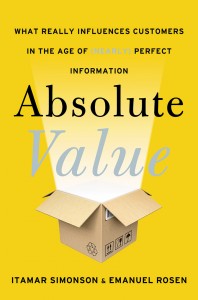Who determines absolute value?
March 5, 2014
 Many people, myself included, believe in the power of a strong brand. Brand positioning has influenced buying decisions for years and a company with a strong sense of their own brand and a commitment to authentically walking out that brand is at an advantage over their competitors.
Many people, myself included, believe in the power of a strong brand. Brand positioning has influenced buying decisions for years and a company with a strong sense of their own brand and a commitment to authentically walking out that brand is at an advantage over their competitors.
In the past, a great brand could significantly influence if not determine the absolute value of a product or service.
But, is that marketing truth evolving?
I’ve just finished reading the book Absolute Value, What Really Influences Customers in the Age of Nearly Perfect Information* by Itamar Simonson and Emanuel Rosen and it digs into this issue. The book offers many examples of how consumers have viewed and evaluated brands in the past and how they are coming to interact and judge them today. When you see the trends spelled out, in example after example, it’s pretty eye opening.
To kick things off — the authors list 5 widely held beliefs and suggest that they are all becoming less true today.
- A company’s brand is more important today than it has ever been
- Nurturing loyalty should be the marketer’s primary, day-to-day concern
- All customers are irrational
- An overload of opinions may actually paralyze people
- Positioning is the most important part of the marketing game
The authors assert that most brands are losing their role as a definer of quality and that a consumer’s past satisfaction is not as anchoring as it used to be. They also contend that because of the abundance of rational information that is so readily available to all of us, our methods of evaluating products and services has changed dramatically.
We really don’t shop/buy the way we used to. Let’s say you need to buy a car. Back in the day, you either went to a dealer based on your brand preference or you might have reacted to a TV spot or your neighbor’s experience.
But today, what would you do? You would look online and read the reviews. You’d look at safety reports. You’d then go to a site and could review exactly what the dealer paid for any car you were interested in. Finally, armed with print outs and a price you knew was 3% over dealer invoice, you’d head to the dealership.
Suddenly, you have access to all kinds of data that wasn’t readily available a decade ago and much of that data is ranking, grading and critiquing the item in question.
Given those two choices – a fuzzy brand preference or hundreds/thousands of reviews from other people – which do you think will influence you more today?
If you’re like most other people, you’ll trust the masses more than your own perception or previous experiences, unless you’re already a brand zealot.
That’s where the problem comes in for marketers. In this new marketplace, there’s a voice that is overshadowing theirs. And it’s not just word of mouth. It’s word of mouth, amplified. Many voices and they’re so much easier to find/listen to. And it turns out, their collective wisdom and experience is quite compelling.
This book is a thought provoking read. (Buy a copy of the book**) It will make the marketer in you tilt your head and really wonder about the effectiveness of your efforts. It will make the consumer in you examine your own purchasing patterns and identify some of your biggest influencers.
But whichever hat you’re wearing — it will force you to look at our world and your work in marketing a little differently. Just like your consumers are doing.
*I received a copy of this book from Emanuel Rosen but I really did read it and I really liked it and found it thought provoking. You’d be amazed at the number of books I receive that I don’t really like… and therefore, don’t mention to you.
**Amazon affiliate link
More


